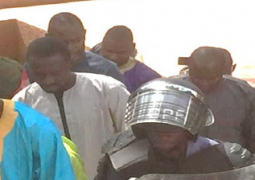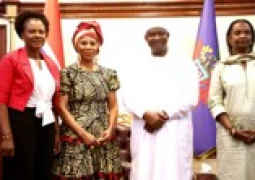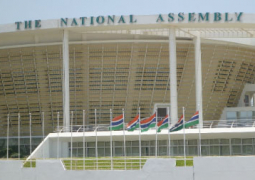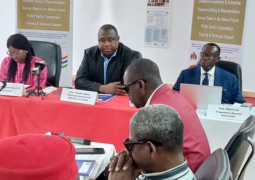The Local Government Commission of Inquiry, presided over by Chairperson Jainaba Bah, questioned Saidyleigh about transactions related to the clearing of containers at the Banjul Port.
Saidyleigh recounted his involvement in handling the clearance of two containers received through a partnership between Mansakonko Area Council and Mission Gambia-Malta Foundation. According to his testimony, he was verbally instructed by Mansakonko Area Council CEO Seedy K. Touray to lead the clearing process. To facilitate this, cheques were drawn in his name.
When pressed about the financial details of the clearing process, Saidyleigh claimed ignorance (that he forgot) of the exact amount but provided invoices from the port's clearing agents. However, Deputy Lead Counsel Patrick Gomez raised concerns about the photocopies of the invoices and requested the originals, which Saidyleigh stated were with the accounts office.
The invoices, dated September 17, 2021, amounted to D16,600 and D73,395 respectively. Despite the photocopy issue, both invoices were admitted into evidence for the time being.
As the proceedings unfolded, Saidyleigh disclosed that the remaining portion of the withdrawn funds covered his examination, tuition, and registration fees for a procurement course at the MDI with the CIPS (Chartered Institute of Procurement and Supply) in 2021
He enumerated that the tuition fee was D15,200, adding he also paid D2,500 for 5 modules, 100 pounds sterling for the registration fee, 65 pounds for the subscription fee and 33 pounds for five modules (examination fee for each registered course). He was asked to tally the amounts while hearing proceeded.
Probed on the nature of the financial support, Saidyleigh clarified that it was a sponsorship by the council. He claimed to have submitted a letter to the Establishment Committee seeking scholarship.
However, he wasn’t able to provide his purported letter of application, saying he had “sincerely searched for it but couldn’t see it”.
He added: But I have a minute [record of the Establishment Committee] where it was shown that I had submitted the letter to the committee.
He also said he had the letter of approval from the Establishment Committee. He provided the purported letter to the council. However, Counsel Gomez raised that the approval only mentioned D37,000. He asked the witness if the original document he had been provided with was signed, but he said the unsigned document was the very one he was given.
At this juncture, the witness was asked to provide the total figure of the two invoices that were first tendered. He said they amounted to over D89,995 which in addition to the duty waiver tallied over 94,995. Together with the tuition fee, it amounted to over D132,155.
“How about if you subtract that from what you have withdrawn from the account? You have withdrawn D199,209” the deputy counsel told him.
The procurement assistant announced that with D132,155 subtracted from D199,209, the remainder would be D67,054.
Mr Saidyleigh, who had been attempting to explain, was given the floor by the deputy council to explain.
He said: “This was the one for my certificate level 2. And then I also proceed to level 3 with the same institution.”
Asked about the approval, he said he didn’t get any approval for that. “I didn’t write to the Establishment Committee for that.
“Then how did you pay your tuition fee using the council’s funds then?” asked the counsel.
He said responded that the council funded it.
“Without your tuition being granted. You didn’t apply.” the counsel put to him.
“I thought this tuition would cover that,” he answered.
The deputy counsel told the witness that the letter of approval was very specific in relation to what had been approved. The witness said although the letter was specific about level 2, it however covered the entire programme.”
He further explained: “Like this minute shows that I have written to the Establishment Committee to support me for my course. So, the course does not stop at level 2 only. That is why I proceeded to level 3.
Counsel Gomez agreed with the witness concerning the explanation provided but wanted to provide a basis. “But even assuming you applied for [your course] to be paid throughout, your level 1, 2 and 3 and all with university and master’s degree programme, what is approved is what is relevant. So, you can only benefit from the amount of money that has been approved for your course.”
The witness agreed. Thus, he also accepted that there was no written approval for his subsequent level 3.
As hearing progressed, Saidyleigh further revealed that the cheques were typically signed by the CEO and finance director. Despite having a soft copy of his level 2 certificate, which he said the Commission could print if it wanted, he couldn't produce the physical copy during the hearing. He said he was yet to receive his level 3, as these certificates come from the UK.
The inquiry continues to unravel the financial intricacies surrounding Mansakonko Area Council, with Saidyleigh's testimony inferring deficiency of transparency and accountability in the manner in which council’s funds are expended.
Read Other Articles In Headlines

Weapons are intact to carry out the coup - witness quotes coup leader
Feb 24, 2023, 12:34 PM




